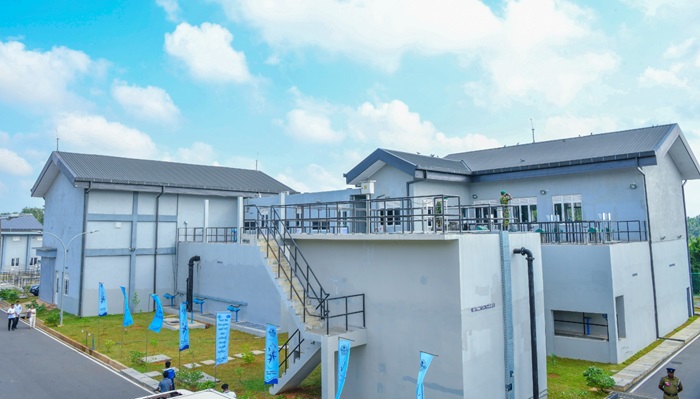
President Ranil Wickremesinghe has emphasized that the Anuradhapura North Water Supply Project is designed to safeguard agriculture in the region.
Addressing concerns during the inauguration of its inaugural phase, the President assured farmers that the project not only caters to drinking water needs but also supports agricultural activities, urging them to dismiss any unfounded apprehensions.
President Wickremesinghe made these remarks during the inauguration of the initial phase of the Anuradhapura North Water Supply Project this morning (Feb 15).
According to the President’s Media Division (PMD), this endeavour was spearheaded by the Ministry of Water Supply and Estate Infrastructure Development, with financial backing from the Japan International Cooperation Agency (JICA).
The project aims to address the long-standing issue of kidney disease-afflicted regions such as Medavachchiya, Padaviya, Kabithigolleva, Horowpatana, and Kahatagasdigiliya, by ensuring access to clean drinking water.
The first phase centred around the Anuradhapura Maha Kanadarawa Lake, has already begun serving approximately 25,000 families across 75 village service areas within the Rambewa and Medavachchiya Divisional Secretariat Divisions.
President Wickremesinghe further assured that this initiative would not compromise local agriculture.
He underscored the dual purpose of the Anuradhapura North Water Supply Project, which not only caters to drinking water needs but also supports agricultural activities.
Furthermore, he mentioned plans for the impending Malwatu Oya Reservoir project from the previous administration, indicating the government’s commitment to advancing the North Central Province as a hub for renewable energy.
- Following is President Ranil Wickremesinghe’s statement made at the event;
Minister Jeevan Thondaman has assumed the significant responsibility of ensuring water access to these regions, with more households across the country still in need of such provisions. Additionally, it is imperative to equip the Tamil communities residing in the upcountry regions with essential infrastructure, as development in these areas lags behind. Urgent measures are required to address these issues, a task Mr. Jeevan Thondaman is actively pursuing today.
The Anuradhapura North Water Supply Project commenced in 2013, aiming to alleviate the plight of those afflicted by kidney disease in these regions by providing clean drinking water. Simultaneously, provisions for water crucial to agricultural activities are also being prioritized.
Concerns have been raised regarding potential water loss for agricultural use during project implementation, but assurances have been given that such outcomes will be avoided. Mitigation strategies are in place to safeguard against any adverse effects.
The demand for water is twofold: for agricultural cultivation and residential needs. The challenges faced by individuals, including having to justify their actions to their families after engaging in public campaigns, underscore the pervasive nature of this issue.
I assure you that this project will effectively address both concerns by providing water for agricultural purposes and ensuring access to clean drinking water.
Despite the challenges posed by the recent economic downturn, we persevered to complete this project by securing the necessary funds, a significant obstacle in itself. Taking office in 2022 due to a lack of alternative candidates, we, with the support of various parties, initiated a national reconstruction program amidst challenging circumstances.
Facing scepticism and practical obstacles, such as fertilizer shortages and fuel scarcities, we prioritized resolving these pressing issues before contemplating elections. While substantial progress has been made in revitalizing the economy, our debt burden remains, necessitating a sustained focus on economic revitalization to avoid further borrowing.
Upon assuming leadership, our immediate concern was addressing the populace’s basic needs, including food and fuel shortages. In times of crisis, it is paramount for any government to prioritize meeting these fundamental requirements, as emphasized by Mr. Lenin during the Russian Revolution of 1917, who advocated for “Peace, Land, Bread” before espousing communist ideals.
Initially, our foremost priority was establishing peace and stability throughout the country, a goal that has been realized today. The prevailing environment ensures the rule of law and permits freedom of expression and assembly, allowing citizens to voice criticism and engage in peaceful demonstrations.
Subsequently, our focus shifted to addressing food insecurity by facilitating agricultural activities. Through collaboration with the United States, we acquired fertilizer to boost paddy cultivation, resulting in successful harvests in 2022 and 2023. Additionally, essential food items such as rice and flour were distributed to the populace.
Another critical initiative was the allocation of land, realized through the ‘Urumaya’ program, alongside endeavours to grant ownership of flats in Colombo to eligible individuals.
To foster a robust economy, we embarked on an agricultural modernization program aimed at improving water management and introducing new crops. Historical precedence demonstrates the potential for rice cultivation not only to sustain domestic needs but also to serve as an export commodity, akin to the country’s role as an oriental granary during ancient times.
Had such initiatives been enacted earlier, our nation would not be reliant on external assistance today. Furthermore, efforts have been directed towards attracting new industries and bolstering tourism, recognizing that merely providing food is insufficient. Generating employment opportunities for the youth is imperative, especially considering the lack of job creation in recent years.
To expedite economic progress, foreign investments are crucial, necessitating the formulation of new legislation to facilitate this endeavour. Let us unite in advancing this transformative agenda and collectively propel our nation towards prosperity.
During elections, it’s natural for political factions to diverge, but post-election, there should be avenues for reconciliation and collaboration. We ought to institute a system that allows for such flexibility. The residents of our villages gain nothing from division; hence, I urge everyone to unite for a common cause. Let’s work together, not for any particular political agenda, but for the betterment of our people. Collective efforts will expedite progress significantly.
It’s important to recognize the significance of the water supply project in the North Central region. Additionally, discussions are underway regarding the Malwatu Oya project.
In tandem with these water initiatives, we’re actively exploring the establishment of power plants in the north-central area, leveraging both thermal and wind energy resources. Transforming this province into a major renewable energy hub holds immense potential. Furthermore, proposals for power plants utilizing lake resources are being discussed, promising substantial economic gains. I appeal to all for their support in forging a new economic landscape and securing a prosperous future for our citizens.
- Statement of Minister of Water Supply and Estate Infrastructure Development Jeevan Thondaman;
When I took over this ministry in January 2023, I was explicitly told that we would not be able to even provide 10,000 connections.But today I stand before you, one year later, and I can proudly tell you that we have achieved close to 103,000 connections and we are well on our way to achieving close to 200,000 by the end of this year. And all this was made possible due to the guidance of the President, Ranil Wickremesinghe, though there may be various narratives created and those who are capable of understanding this will understand.
When we went into crisis, President Ranil Wickremesinghe was not using organizations and trying to bring the country down. He was not in the jungle taking photos of animals while the country was burning. He stood up and he took over the reins of this country and he has brought us out of this unprecedented economic crisis and we are well on our way to recovery.
- Statement of State Minister of Finance Shehan Semasinghe;
This project has the capacity to fulfill the drinking water requirements of 25,000 families, offering relief from kidney disease prevalent in the region. The subsequent phase aims to extend this benefit to an additional 55,000 families in Medavachchiya, Padaviya, Kabithigolleva, Horowpatana, and Kahatagasdigiliya.
While today’s meeting did not transpire, certain political factions are attempting to impede the project’s second phase by instilling unfounded apprehensions among farmers regarding agricultural impacts. Such actions are unacceptable and must be thwarted.
- Statement of State Minister for Irrigation and Water Supply Shasheendra Rajapaksa;
The Ministry of Health is observing the positive outcomes of the project, which will be documented in future reports. The primary cause of kidney disease in this province is the absence of clean drinking water. Presently, one segment of the province can access clean water, with the completion of the second phase expected to serve another group’s drinking water needs. No issues have arisen concerning the project.
Following the directives of the President, last week, we convened all relevant officials, including the Chairman of the Water Supply Board, the General Manager, district engineers, project supervisors, and the Ministry of Irrigation’s Secretary, who approved the project. We held comprehensive discussions to address any concerns or prejudices. It is our duty to manage any biases and ensure equitable access to resources. We collectively agreed to proceed without bias, particularly safeguarding the agricultural activities relying on water from the Mahakanadarawa Lake.
In initiating this project, our focus was on enhancing the capacity of the lake. Half of this augmented capacity will be allocated to provide clean drinking water to the local populace. Farmers often face anxiety during periods of inadequate water for cultivation, particularly during intercropping seasons. To address this concern, this year’s budget has earmarked one billion towards the Ministry of Irrigation.
This allocation aims to elevate the Beruweva sluice gates, enabling water transfer from Beruweva to the Mahakanadara Lake, thereby mitigating water scarcity. Currently, the necessary canal infrastructure is in place, with plans to address any remaining shortcomings. It is imperative to underscore that the success of this drinking water project hinges on ensuring no detriment to the agricultural activities of local farmers. We unequivocally affirm our commitment to act impartially and prevent any injustices towards either party. Regardless of the project’s merits, any attempt to exploit it for political gain would not only be detrimental to the area’s residents but also to the nation as a whole.
This project operates with utmost transparency, as evidenced by the opportunity for representatives from farmers’ organizations to inspect the water distribution process at pumping stations. Furthermore, agreements are being pursued with the Water Supply Board, Irrigation Department, and farmers’ organizations, documented through a Memorandum of Understanding, to safeguard the interests of all stakeholders and prevent any injustices.
- Statement of President of Japan International Cooperation Agency (JICA) Tanaka Akihiko;
It is a real pleasure to visit this beautiful ancient city of Anuradhapura, a renowned world heritage site, as it sits on the remains of the oldest and longest lasting kingdom in Sri Lankan history. I have learned that Anuradhapura is known within Sri Lanka as a historically important centre for the development of hydraulic and hydrological technologies.
The creation of a vast irrigation network made of water and water-based materials is one of the greatest in the country for agricultural production. Today we gather to celebrate the completion of this project that will transform the lives of residents of Dambewa and Medawachchiya and pave the way for a healthy future in this famed part of Sri Lanka.
This project will provide access to sufficient quantities of safe drinking water from the Mahakanadarawa tank to 25,000 families. It signifies a tangible improvement in their quality of life.
Japanese Ambassador to Sri Lanka Misukoshi Hidayaki, Governor of the North Central Province Mahipala Herath, Members of Parliament SM Chandrasena, Duminda Dissanayake, Ishaq Rahuman, H. Nandasena, former Chief Minister of the North Central Province SM. Ranjith, former Minister P. Harrison, President of Japan International Cooperation Agency (JICA) Tanaka Akihiko, Japan International Cooperation Agency Chief Representative in Sri Lanka Yamada Tetsuya, National Water Supply and Drainage Board Chairman Nishantha Ranatunga and others attended this event. (NewsWire)


